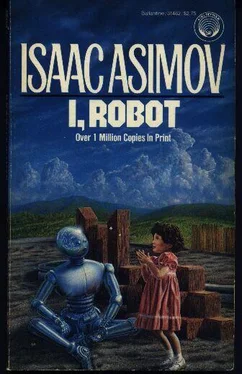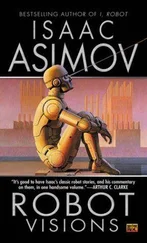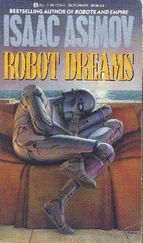Isaac Asimov - I, Robot
Здесь есть возможность читать онлайн «Isaac Asimov - I, Robot» весь текст электронной книги совершенно бесплатно (целиком полную версию без сокращений). В некоторых случаях можно слушать аудио, скачать через торрент в формате fb2 и присутствует краткое содержание. Жанр: Фантастика и фэнтези, на английском языке. Описание произведения, (предисловие) а так же отзывы посетителей доступны на портале библиотеки ЛибКат.
- Название:I, Robot
- Автор:
- Жанр:
- Год:неизвестен
- ISBN:нет данных
- Рейтинг книги:5 / 5. Голосов: 2
-
Избранное:Добавить в избранное
- Отзывы:
-
Ваша оценка:
- 100
- 1
- 2
- 3
- 4
- 5
I, Robot: краткое содержание, описание и аннотация
Предлагаем к чтению аннотацию, описание, краткое содержание или предисловие (зависит от того, что написал сам автор книги «I, Robot»). Если вы не нашли необходимую информацию о книге — напишите в комментариях, мы постараемся отыскать её.
I, Robot — читать онлайн бесплатно полную книгу (весь текст) целиком
Ниже представлен текст книги, разбитый по страницам. Система сохранения места последней прочитанной страницы, позволяет с удобством читать онлайн бесплатно книгу «I, Robot», без необходимости каждый раз заново искать на чём Вы остановились. Поставьте закладку, и сможете в любой момент перейти на страницу, на которой закончили чтение.
Интервал:
Закладка:
Nor did Dr. Bogert's sleek paleness abandon a certain hangdog attitude. Nor did Major-general Kallner, who headed the project, even once forget to maintain a hunted expression. In short, it was a grisly episode, that meal, and the little session of three that followed began in a gray, unhappy manner.
Kallner, with his baldness glistening, and his dress uniform oddly unsuited to the general mood, began with uneasy directness.
"This is a queer story to tell, sir, and madam. I want to thank you for coming on short notice and without a reason being given. We'll try to correct that now. We've lost a robot. Work has stopped and must stop until such time as we locate it. So far we have failed, and we feel we need expert help."
Perhaps the general felt his predicament anticlimactic. He continued with a note of desperation, "I needn't tell you the importance of our work here. More than eighty percent of last year's appropriations for scientific research have gone to us-"
"Why, we know that," said Bogert, agreeably. "U. S. Robots is receiving a generous rental fee for use of our robots."
Susan Calvin injected a blunt, vinegary note, "What makes a single robot so important to the project, and why hasn't it been located?"
The general turned his red face toward her and wet his lips quickly, "Why, in a manner of speaking we have located it." Then, with near anguish, "Here, suppose I explain. As soon as the robot failed to report a state of emergency was declared, and all movement off Hyper Base stopped. A cargo vessel had landed the previous day and had delivered us two robots for our laboratories. It had sixty-two robots of the… uh… game type for shipment elsewhere. We are certain as to that figure. There is no question about it whatever."
"Yes? And the connection?"
"When our missing robot failed of location anywhere – I assure you we would have found a missing blade of grass if it had been there to find – we brainstormed ourselves into counting the robots left of the cargo ship. They have sixty-three now."
"So that the sixty-third, I take it, is the missing prodigal?" Dr. Calvin's eyes darkened.
"Yes, but we have no way of telling which is the sixty-third."
There was a dead silence while the electric clock chimed eleven times, and then the robopsychologist said, "Very peculiar," and the corners of her lips moved downward.
"Peter," she turned to her colleague with a trace of savagery, "what's wrong here? What kind of robots are they, using at Hyper Base?"
Dr. Bogert hesitated and smiled feebly, "It's been rather a matter of delicacy till now, Susan."
She spoke rapidly, "Yes, till now. If there are sixty-three same-type robots, one of which is wanted and the identity of which cannot be determined, why won't any of them do? What's the idea of all this? Why have we been sent for?"
Bogert said in resigned fashion, "If you'll give me a chance, Susan – Hyper Base happens to be using several robots whose brains are not impressioned with the entire First Law of Robotics."
"Aren't impressioned?" Calvin slumped back in her chair, "I see. How many were made?"
"A few. It was on government order and there was no way of violating the secrecy. No one was to know except the top men directly concerned. You weren't included, Susan. It was nothing I had anything to do with."
The general interrupted with a measure of authority. "I would like to explain that bit. I hadn't been aware that Dr. Calvin was unacquainted with the situation. I needn't tell you, Dr. Calvin, that there always has been strong opposition to robots on the Planet. The only defense the government has had against the Fundamentalist radicals in this matter was the fact that robots are always built with an unbreakable First Law – which makes it impossible for them to harm human beings under any circumstance.
"But we had to have robots of a different nature. So just a few of the NS-2 model, the Nestors, that is, were prepared with a modified First Law. To keep it quiet, all NS-2's are manufactured without serial numbers; modified members are delivered here along with a group of normal robots; and, of course, all our kind are under the strictest impressionment never to tell of their modification to unauthorized personnel." He wore an embarrassed smile, "This has all worked out against us now."
Calvin said grimly, "Have you asked each one who it is, anyhow? Certainly, you are authorized?"
The general nodded, "All sixty-three deny having worked here – and one is lying."
"Does the one you want show traces of wear? The others, I take it, are factory-fresh."
"The one in question only arrived last month. It, and the two that have just arrived, were to be the last we needed. There's no perceptible wear." He shook his head slowly and his eyes were haunted again, "Dr. Calvin, we don't dare let that ship leave. If the existence of non-First Law robots becomes general knowledge-" There seemed no way of avoiding understatement in the conclusion.
"Destroy all sixty-three," said the robopsychologist coldly and flatly, "and make an end of it."
Bogert drew back a corner of his mouth. "You mean destroy thirty thousand dollars per robot. I'm afraid U. S. Robots wouldn't like that. We'd better make an effort first, Susan, before we destroy anything."
"In that case," she said, sharply, "I need facts. Exactly what advantage does Hyper Base derive from these modified robots? What factor made them desirable, general?"
Kallner ruffled his forehead and stroked it with an upward gesture of his hand. "We had trouble with our previous robots. Our men work with hard radiations a good deal, you see. It's dangerous, of course, but reasonable precautions are taken. There have been only two accidents since we began and neither was fatal. However, it was impossible to explain that to an ordinary robot. The First Law states -I'll quote it- 'No robot may harm a human being, or through inactiotn, allow a human being to come to harm.'
"That's primary, Dr. Calvin. When it was necessary for one of our men to expose himself for a short period to a moderate gamma field, one that would have no physiological effects, the nearest robot would dash in to drag him out. If the field were exceedingly weak, it would succeed, and work could not continue till all robots were cleared out. If the field were a trifle stronger, the robot would never reach the technician concerned, since its positronic brain would collapse under gamma radiations – and then we would be out one expensive and hard-to-replace robot.
"We tried arguing with them. Their point was that a human being in a gamma field was endangering his life and that it didn't matter that he could remain there half an hour safely. Supposing, they would say, he forgot and remained an hour. They couldn't take chances. We pointed out that they were risking their lives on a wild off-chance. But selfpreservation is only the Third Law of Robotics – and the First Law of human safety came first. We gave them orders; we ordered them strictly and harshly to remain out of gamma fields at whatever cost. But obedience is only the Second Law of Robotics – and the First Law of human safety came first. Dr. Calvin, we either had to do without robots, or do something about the First Law – and we made our choice."
"I can't believe," said Dr. Calvin, "that it was found possible to remove the First Law."
"It wasn't removed, it was modified," explained Kallner. "Positronic brains were constructed that contained the positive aspect only of the Law, which in them reads: `No robot may harm a human being.' That is all. They have no compulsion to prevent one coming to harm through an extraneous agency such as gamma rays. I state the matter correctly, Dr. Bogert?"
"Quite," assented the mathematician.
"And that is the only difference of your robots from the ordinary NS2 model? The only difference? Peter?"
Читать дальшеИнтервал:
Закладка:
Похожие книги на «I, Robot»
Представляем Вашему вниманию похожие книги на «I, Robot» списком для выбора. Мы отобрали схожую по названию и смыслу литературу в надежде предоставить читателям больше вариантов отыскать новые, интересные, ещё непрочитанные произведения.
Обсуждение, отзывы о книге «I, Robot» и просто собственные мнения читателей. Оставьте ваши комментарии, напишите, что Вы думаете о произведении, его смысле или главных героях. Укажите что конкретно понравилось, а что нет, и почему Вы так считаете.








